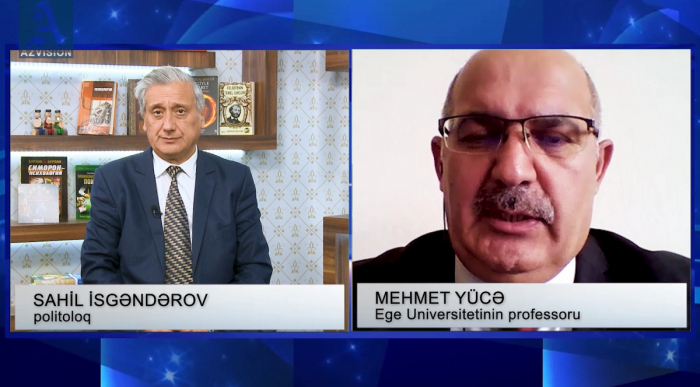The diaspora influence has been growing significantly in terms of financial resource flow, exchange of scientific achievements and high technologies. In this regard, strengthening the role of diasporas in promoting and protecting their homelands around the globe also becomes increasingly important.
Mehmet Yuce, Professor at Aegean University and expert on international issues spoke to AzVision.az and shared his views on what conditions are necessary to shape a strong diaspora and how to establish its relations with the historical homeland.
‘Diaspora serves as an important factor in the continuity of interstate relations. It especially plays a significant role as a crucial element in decision-making, economic ties, relations between countries and the movement of investments. Although the concept of diaspora goes back to the 19th century, it entered circulation as an effective actor in the 20th century. A thought of Greek origin, diaspora is closely related to the concept of power. On the other hand, not every emigration diaspora makes it. The people of the same nation in another country must organize and act jointly to even start speaking of a diaspora. It is defined as a group of people, who spread from one original country or religion to others to live as a minority, or the act of spreading in this way.
The diaspora community do not usually have a strong sense of belonging to the country they live in. They live with the thought that they will one day return to their motherland. They unite around a common history and a common destiny, which motivates them to participate in commercial, political, and such cooperation for the development of their motherland.’
- Can the diaspora influence the foreign policy of their respective countries for the sake of the interests of their historical homelands?
‘Diasporas have a relationship with both the countries they live and visit, and their own motherlands. They often cross the borders of their countries, becoming an interstate civil society. They lobby in their new countries, building strong ties with the state and socio-economic institutions. However, they do not stop at that and continue to build relationships with lobbyist diasporas in other countries, which turn them into interstate actors. We have been observing how diasporas are growing into true power in global politics. At the same time, they are also focusing on specialization within the diaspora.’
- What is the role the diaspora plays in making or attracting investments into their historical homeland?
‘Diaspora entrepreneurship always makes its presence felt in the economy. An excellent illustration of this would be the Jewish Diaspora, who are solid lobbyists in global finance and media. Countries such as India and China employ their diasporas to channel investment and open strategic sectors to interstate competition. The diasporas are also interested in securing benefits for their home countries, such as directing investments into them. They are masters of promoting their countries internationally.
Intellectuals and scientists can play an important role within the diaspora, which is why countries want to build relationships with the scientists in the diaspora and benefit from their positions. Those, who are employed in technology, healthcare and social areas have a strong stance in their fields, which makes them able to make decisions in favour of their historical homelands.
The diaspora also has great intellectual opportunities to offer, especially among first or second-generation emigrants, who later return home and apply the expertise they have gained for the benefit of their own country. They can be the leaders in technology transfer, especially if they are employed in the field in large and developed countries.
They play a crucial role in investment flow, which tends to move cautiously. Investing in a country requires meeting certain conditions. Diaspora members invest in their homelands because they trust it. We have been seeing examples of this in Turkey recently. Businesspeople of Turkish origin have been investing heavily in the country despite the anti-Turkish narrative in the West.’
- Which diasporas have made a big leap in the recent 40 to 50 years?
‘Historically, we can talk about the Jewish, Armenian, Chinese, and African diasporas. The strongest one after the Jewish Diaspora is the Armenian community abroad. They put forward great efforts to make their presence felt strongly in the Western countries they live in, especially in America. We must also admit that the Greek diaspora is particularly strong, who can take part in elections in America and influence certain social circles. They strongly demonstrate their presence in economic terms.
Apart from these classic diasporas, the active ones today include communities from China, India, Lebanon, the Philippines, and Iran. We have also seen the Turkish diaspora gradually grow.’
- Which success stories could Azerbaijani diaspora benefit from?
‘We must first determine the number of Azerbaijanis living in various countries, the fields they are employed in and fields they have influence over. This requires building a strategic plan. The officials involved in the field must be sufficiently educated on how diasporas operate and how to cooperate with them.
Developing a mechanism of cooperation with the diasporas of the Turkic states is key, especially the Turkish one. The ‘Turkic World Vision 2040` program has put forward goodwill in this regard.
We must also benefit from scientists working in foreign universities and students abroad. Activating them could facilitate building the infrastructure for a strong diaspora.
There is a great need for an entrepreneurial diaspora. We must especially deepen cooperation with Azerbaijani and Turkish businesspeople, and entrepreneurs from friend countries to Azerbaijan, such as Israel and Pakistan, to attract investment into the country. The diaspora can play a crucial role in developing and strengthening the economy by motivating foreign investments from these sources to areas outside the oil sector and establishing cooperation between Azerbaijani and foreign businesspeople. I am confident that the Azerbaijani diaspora is capable of making it happen.’
AzVision analytical group
More about:















































